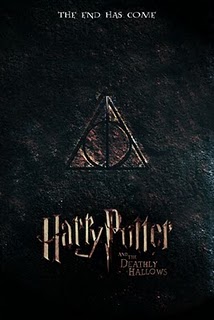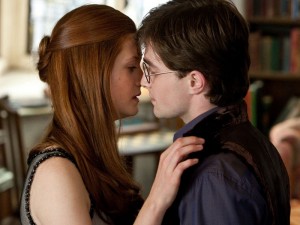“These are dark times, there is no denying. Our world has perhaps faced no greater threat than it does today.”
These ominous and dreary words are the first ones uttered in the film Harry Potter and the Deathly Hallows, Part I. If you have not seen the film or read the book, consider that spoilers follow. Spoilers such as the fact that the Minister of Magic who speaks these words then pays Harry a visit about thirty minutes into the film only to have his death announced in the following scene. He is not the first character to die in the film much less the series, but his opening words set a dark and foreboding tone very much in keeping with author J.K. Rowling’s statement that death is “possibly the most important theme” in the entire Harry Potter series. [1]
As in the series, it often feels like we Muggles living today are also surrounded by our own Death Eaters, our own forces of darkness which would overwhelm and destroy us. Accidents, killings, suicides, war dead, natural disasters, financial upheaval, unemployment, et cetera. Death Eaters for us take the form of news of any one of a number of tragedies both at home and abroad. How can we not feel in danger at times of being consumed by this very real and present darkness?
Last week’s post mentioned that most of us prefer to not think about the generally depressing subject of death. We defend against it with our own magic potions comprised of equal parts denial and repression. We launch into new projects, always looking toward the future, or we escape into a rich fantasy life in our minds or on TV and movie screens.
Over the past month Mythfire’s blogs have put forward multiple ideas of how a person might soulfully embrace the darker aspects of life and death – rather than try to escape from or defend against them. [2] The present post continues this soul-making project with the help of J.K. Rowling and Harry Potter. Located between the aforementioned opening pronouncement by the Minister of Magic in Deathly Hallows, Part I, and his death about thirty minutes later, two scenes from the same film set the stage for what follows.
First, amid the clouds of death and darkness, Harry Potter and his girlfriend Jenny Weasley share a tender moment in the kitchen of her home. A banner along one wall bears the names of her brother Bill and Fleur, his bride-to-be. Everyone has converged on the home to join in the wedding celebrations. “Seems silly, doesn’t it, a wedding given everything that’s going on?” Jenny says. Harry replies, “Maybe that’s the best reason to have it—because of everything that’s going on.” Then they kiss.
The second scene is the wedding celebration itself in a tent that has been erected for this special occasion. People are decked out in fancy clothes and jewelry or, as in the case of Ron Weasley, their ragged best. For a moment at least there is a festive atmosphere.
This sequence brings to mind some lines from mythologist Joseph Campbell:
“The spirit of the festival, the holiday, the holy day of the religious ceremonial requires that the normal attitude toward the cares of the world should have been temporarily set aside in favor of a particular mood of dressing up. The world is hung with banners.”[3]
Phil Cousineau, a friend and colleague of Campbell’s, adds:
“Throughout human history, Campbell emphasizes, the festival’s purpose has been to transfigure the unbearably harsh realities of life into bearable realities, and it has done so by lifting the spirit of the individual and the group through ecstatic rituals and through the trials of competition and contest.”[4]
The wedding festival in Harry Potter and the Deathly Hallows, Part I, the other dances and/or balls from earlier films and even the often festive atmosphere in Hogwarts’ main dining hall all correspond to the ecstatic ritualistic transfiguration mentioned in this quote. Likewise, “the trials of competition and contest” are also evident in each film – especially those in which the game of quidditch plays a role.
In fact, the striking similarity between the word quidditch and quiddity, (L. quidditas), may add to our understanding of the profound importance of play. Webster’s dictionary defines quiddity as “whatever makes something to be of the type that it is: Essence.” Looked at in this light, quidditch, like all games, at times seems to be a very serious ordeal fraught with tension, competition, uncertain outcomes and even setbacks. And yet its defining essence, or that which makes it a game, is an experience whereby the present moment transforms into something special.
For both Campbell and Cousineau, this transformative experience is play:
“[P]lay is both instinctual and existential. It allows us to seize the moment and celebrate life while defying the gravity of convention by juggling with the balls of reality. Existentially, play brings us home to what Buddhists call ‘the miracle of the present moment.’ Its ecstatic nature reminds us at every moment that we need not be victims of fate [. . .].”[5]
At some point in the future I hope to take up a scene in Deathly Hallows, Part II, in which Harry puts the golden snitch to his lips and whispers “I am ready to die.” He has learned that by embracing his fate he is not a victim to it. And it is very telling that the snitch, probably the most important part of every quidditch match, is the recipient of Harry’s words. Play enables us to transcend the terrors of the moment by revealing this same moment to also be terribly beautiful and miraculous…ours and no one else’s.
Last but certainly not least, let us along with Harry also remember that love and “the jewel of all games,” i.e. love-play, like other types of spiritual play make bearable and meaningful moments which otherwise appear oppressive, dark, and bleak. The key, as with Harry and Jenny, is sharing and playing together — “because of everything that’s going on.”
——
Coda: When determining if play is existential as described above or merely escapist, perhaps we would do well to once again listen to Cousineau: “We play on for reasons that transcend escapism.We play on to bring ourselves back to life, to re-create ourselves, to remind ourselves that we have the capacity to be more than ordinary, that we have the courage to be extraordinary, if only for a few moments on the field, in the arena, around the track. We play on to rekindle the fire that is perennially in danger of going out.” (173)
——
[2] The alluded to ideas from recent posts include: seeing ourselves and others as playing a part in a story or myth that began a long time ago and will end long after we are gone; intentionally accepting and exploring our personal psychology including shortcomings, compulsions, neurotic tendencies, etc. as attempts on the part of soul to deepen our experience of life now; realizing the degree to which our understanding of both life and death are reflections of ego fears and desires rather than unconscious/archetypal realities; and paying tribute to or acknowledging the psychological as well as physical aspects of death – even seeing them as the source of personal renaissance in this world. Finally, another attitudinal response to death which need not be a defense or escape from it is of course a belief in an afterlife.
[3] Campbell, Joseph. The Masks of God: Primitive Mythology. Rev. Ed. New York: Penguin, 1969: 25. Italics added.
[4] Cousineau, Phil. The Olympic Odyssey: Rekindling the True Spirit of the Great Games. Wheaton, Ill.: Quest Books, 2003: 79.
[5] Ibid., 56.




Wow…”death as the most important theme” is definitely an attitude I share at the moment.